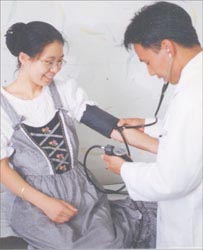
- 빈혈이 있나 알아보기 위해서 헤모글로빈이나 헤마토크리트를 검사한다.
- ABO 혈액형과 Rh 혈액형검사를 한다.
- 매독에 걸렸는지 알아보기 위해서 매독 혈청검사를 한다.
- 풍진 바이러스에 면역됐는지 알아보기 위해 풍진 바이러스 면역체검사를 한다.
- A형이나 B형 간염 바이러스, 그 밖의 다른 종류의 간염 바이러스, 에이즈 (AIDS) 바이러스 등에 감염됐는지 알아보기 위해서 피검사를 할 때도 있다.
- 당뇨병이나 그 밖의 다른 병으로 인해서 소변에 당이 있는지 알아보기 위해서 소변검사를 한다.
- 신장 기능이 정상인지 비정상인지 알아보기 위해서 소변검사를 한다.
- 임신 중독증으로 소변에 단백이 나오는지 알아본다.
- 요로 감염으로 세균 및, 또는 백혈구 등이 소변에 있는지 알아보기 위해서 소변검사를 한다.
Copyright ⓒ 2014 John Sangwon Lee, MD., FAAP
When to go for the first pregnancy examination 첫 정기 임신 검진을 받으러 병원에 갈 때
- In general, when you go to the maternity hospital for your first regular pregnancy checkup, it takes more time to get the checkup than when you go to the second regular pregnancy checkup.
- Before the first regular pregnancy checkup, doctors, nurses, or those who work there will also take a closer look at the past and present medical history of the pregnant woman from birth to the present and the medical history of the pregnant woman and her husband’s family.
- Also, check whether there were any health problems or complications during pregnancy, delivery, and postpartum recovery in the past.


And find out if you have any such problems during pregnancy. Weigh your weight and height Take blood pressure
① The age of menarche, on which day the last menstruation before pregnancy started and ended on which day, and the amount of bleeding during menstruation.
② In the case of nursing mothers, whether there was any health problems or illnesses during the past pregnancy, childbirth, childbirth, or postpartum recovery, whether they were given easy delivery or had abortions, and if so, whether they have ever had a natural or artificial abortion? Also find out about the history of pregnancy.
③ Find out what kind of illness you have suffered from birth to the present and what unusual illnesses your pregnant woman and her husband’s family have suffered in the past. If you have a husband or a pregnant woman’s parents, siblings, who is currently suffering from what disease, if so, what kind of disease you have, if you have had any unusual disease in the past, what kind of disease you have, and what genetic diseases you have in both families. see.
④ Find out about the types of foods you normally eat, their diet, and your daily lifestyle.
⑤ Find out if you are allergic to drugs or food.
⑥ Find out if you are drinking or smoking.
⑦ Other
Receive earthquake resistance as needed
When receiving a regular pregnancy checkup, the method of performing a regular pregnancy checkup is slightly different depending on the number of months of pregnancy and the presence or absence of complications. In general, check your height, weight, blood pressure, body temperature, etc., and receive a checkup as follows. Eyes, nose, ears, mouth, pharynx, teeth, neck, heart, lungs, breasts, stomachs, etc. And I get earthquake resistance Around 4-6 weeks of pregnancy, the external genitalia, vagina, uterus and pelvis are examined. This examination is called an internal examination (Pelvic examination). The pregnancy is confirmed through examination. When receiving a pregnancy checkup, perform the following pregnancy clinical tests as needed.
① Uterus · A Pap test (Papanico staining) or a bacteriological test can be performed to find out if there are benign or malignant tumors or inflammation in the cervix and vagina. Chorionic gonadotropin
You can find out the number of days you were pregnant according to your blood concentration. In addition, a more specific clinical test can be used to diagnose pregnancy as a few weeks. During ectopic pregnancy or spontaneous abortion, Chorionic gonadotropin blood levels decrease. So, when you suspect and worry about this problem, try measuring your Chorionic gonadotropin blood level.
② It is common for a pregnant woman to do a pregnancy test again with a pregnancy test kit at home with her own urine to reconfirm that she is pregnant even if she is pregnant.
③ Even if you have gonorrhea, syphilis, or other types of infectious sexually transmitted diseases, some pregnant women do not know whether they are suffering from such sexually transmitted diseases. A small amount of secretions or vaginal secretions from the cervix are collected, and a bacterial culture test is performed to diagnose sexually transmitted diseases or other types of infectious diseases in the uterus, cervix, vaginal cavity, etc.
④ When receiving a pregnancy checkup, the following blood tests are usually done.
- Hemoglobin or hematocrit is tested to see if you have anemia.
- ABO blood type and Rh blood type are tested.
- Do a syphilis serum test to see if you have syphilis.
- To find out if you are immune to the rubella virus, a rubella virus immunity test is performed.
- Blood tests are sometimes done to see if you are infected with hepatitis A or B virus,
- other types of hepatitis virus, or AIDS virus.
⑤ Urinalysis is done to see if there are any of the following diseases.
- Urinalysis is done to see if there is sugar in the urine due to diabetes or another disease.
- Urinalysis is done to see if kidney function is normal or abnormal.
- Look for protein in your urine due to pregnancy toxicosis.
- Urinalysis is done to see if there are bacteria and/or white blood cells in the urine due to a urinary tract infection.
When receiving a pregnancy checkup, check whether there are any complications of pregnancy, whether the pregnancy is progressing normally, whether the fetus is growing and developing well, whether the results of pregnancy checkups are normal, and whether the results of urine and blood tests are normal or abnormal.
After receiving a pregnancy checkup and clinical examination, a pregnant woman must ask a doctor or nurse if he or she has any questions about the examination results, clinical examination results, or pregnancy.
If you have a problem to ask but do not ask, doctors or nurses think that the pregnant woman knows all about the results of pregnancy checkups and clinical tests.
No matter how insignificant a pregnant woman wants to ask, do not be ashamed to ask. Before going to the hospital for regular pregnancy checkups, you should bring a note of questions to your doctor or nurse. When you go to the hospital for regular pregnancy checkups, if the pregnant woman has any problems mentally or physically, is stressed, or has a lot of anxiety, do not hesitate to inform the doctor or nurse about that, and seek help from other specialists as soon as necessary.
During pregnancy, various diseases or health problems that may occur to the pregnant woman or the fetus can be greatly detrimental to the health of the pregnant woman, fetus, or baby if it is not diagnosed and treated early.
When a pregnant woman has a disease or health problem that is complex and severe and cannot be solved well, a doctor can solve the problem by referring to another doctor who specializes in the disease or health problem more and can better solve the problem.
Ultrasound tests can also be done when you go to the first pregnancy check-up to find out the number of days you have been pregnant and the condition of your baby. Copyright ⓒ 2014 John Sangwon Lee, MD., FAAP
“부모도 반의사가 되어야 한다”-본 사이트의 내용은 여러분들의 의사로부터 얻은 정보와 진료를 대신할 수 없습니다.
“The information contained in this publication should not be used as a substitute for the medical care and advice of your doctor. There may be variations in treatment that your doctor may recommend based on individual facts and circumstances.
“Parental education is the best medicine.“